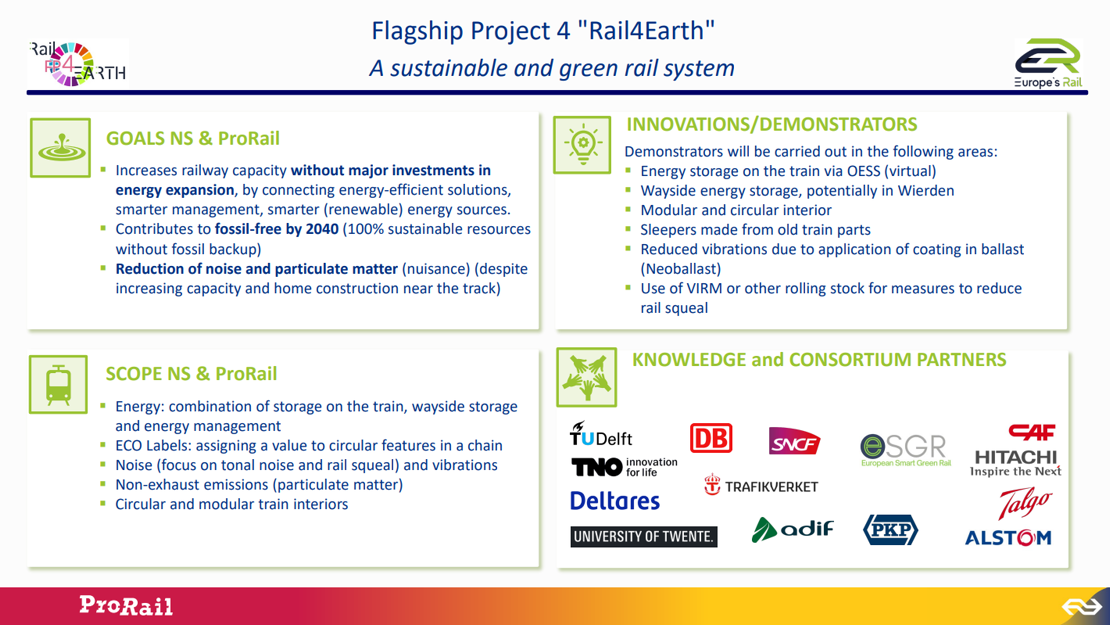Flagship Project 4: RAIL4EARTH - Sustainable and green rail systems focuses on developing and implementing environmentally friendly practices and technologies in the rail industry.

The scope of the project encompasses various aspects of the rail system, including rolling stock (trains), infrastructure, stations, and their sub-systems. The project's primary objectives are centered around sustainability and promoting environmentally friendly practices in the rail sector.
Several key areas of focus within the project include:
- Decarbonization of diesel trains: The project aims to reduce or eliminate the carbon emissions associated with diesel trains, likely by exploring alternative energy sources or propulsion systems.
- Noise and vibration reduction: Efforts will be made to mitigate noise and vibration generated by rail operations, thereby minimizing the impact on surrounding areas and improving the overall quality of life for communities near rail infrastructure.
- Energy saving: The project will explore ways to optimize energy consumption within the rail system, potentially through the use of energy-efficient technologies or improved operational practices.
- Circular economy and resource consumption: Circular economy principles will be applied to the rail system, aiming to minimize waste, promote recycling and reuse, and optimize resource consumption.
- Resilience to climate change: The project will address the challenges posed by climate change and work towards making the rail system more resilient to its impacts. This may include strategies to adapt infrastructure and operations to changing climatic conditions.
- The attractiveness of passenger trains: The project aims to enhance the appeal of rail travel for passengers, potentially through improved comfort, convenience, and overall passenger experience.
The project involves collaboration among 71 partners who will collectively identify the needs of rail operators, taking into account European sustainable transport policies such as the Smart and Sustainable Mobility Strategy. The project will provide scientific and technical solutions by developing and demonstrating new innovations up to Technology Readiness Level 7 (TRL7). This indicates that the solutions will be sufficiently developed and validated to be near commercialization.
Importantly, the project emphasizes viable economic models for the proposed solutions, ensuring they can be rapidly commercialized and benefit European citizens. This indicates a focus on environmental sustainability, economic viability, and market readiness.
WP4 Circular Economy & Environmental Data Management Tools and solutions
Within the RAIL4EARTH project, the AMME research group mainly focuses on work package 4 (WP4). This work package aims to develop methodology and tools for implementing circular economy solutions in the railway sector, specifically focusing on infrastructure, rolling stock (trains), and buildings.
A circular economy is an economic system that minimizes waste and makes the most efficient use of resources by closing the loop of resource consumption and waste generation. In the context of the railway sector, this work package seeks to promote circularity by optimizing resource usage, reducing waste generation, and enhancing recycling and reusability.
WP4 intends to take an integral perspective, meaning it will consider various aspects of the railway sector, such as infrastructure, rolling stock, and buildings, to develop a comprehensive approach to circular economy implementation. One of the project's objectives is to define new environmental indicators highlighting the results and importance of circularity within the railway sector. These indicators will provide a means to measure and assess the impact of circular economy practices and initiatives.
Furthermore, WP4 aims to develop specific circular economy solutions for the railway sector. This includes developing new materials from a circularity perspective, meaning materials designed to be recycled or reused efficiently. Additionally, WP4 will explore ways to reuse materials from trains in the railway infrastructure, thereby reducing waste and promoting resource efficiency.
By implementing these circular economy solutions and practices, WP4 seeks to improve recyclability, reduce the carbon footprint, and decrease CO2 emissions associated with the railway sector. Ultimately, the goal is to make the railway sector more environmentally sustainable and contribute to a more efficient use of resources.
UNIVERSITY OF TWENTE TEAM







